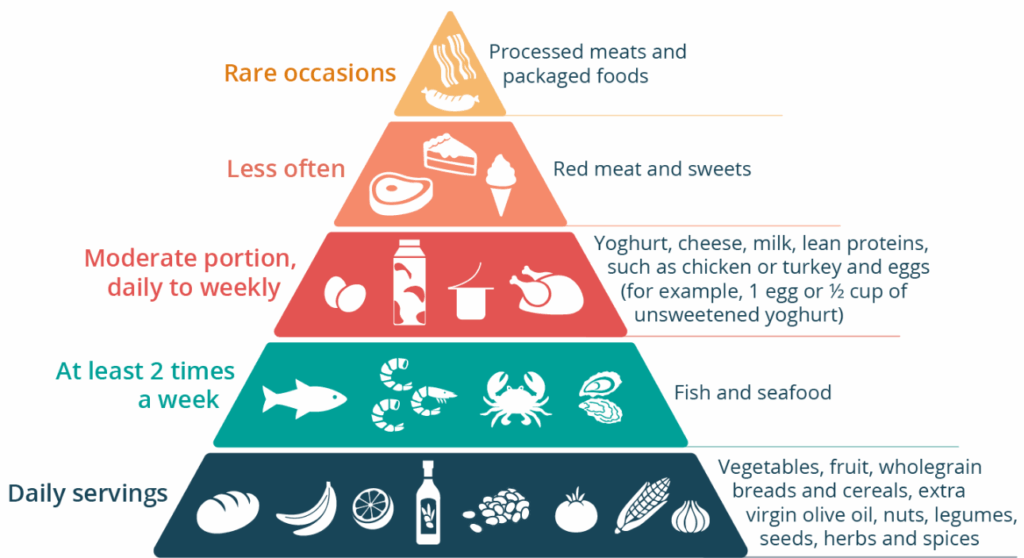You’ve likely heard about the Mediterranean diet’s impressive health benefits, but might wonder what it actually entails and how to begin. This flexible eating pattern isn’t a rigid plan but rather a lifestyle approach centered around whole foods enjoyed by those living near the Mediterranean Sea. It prioritizes plant-based ingredients while minimizing processed foods.
Ready to transform your eating habits with this time-tested approach? Let’s explore how you can start making these nourishing changes today.
Understanding the Mediterranean Diet
Although widely recognized as a modern health phenomenon, the Mediterranean diet traces its origins to the coastal cultures of Greece, Italy, Spain, and other nations along the Mediterranean Sea, with traditions that have evolved over thousands of years. This eating pattern evolved naturally from what was locally available and sustainable.
At its heart, the Mediterranean diet isn’t about strict rules. It’s a flexible, feel-good way of eating built around real, whole foods. Think plenty of fruits, veggies, whole grains, and legumes, all brought together with olive oil as the go-to fat.
What sets it apart from most trendy diets is that it doesn’t cut out entire food groups or ask you to count every calorie. Instead, it’s all about balance, quality ingredients, and enjoying your meals, often with good company. That down-to-earth approach is a big reason why it’s consistently ranked as one of the healthiest ways to eat.

Key Components of a Mediterranean Eating Pattern
The foundation of the Mediterranean diet takes shape through specific food choices that create its distinctive pattern. You’ll build your meals around abundant fresh produce. Colorful vegetables and fruits should cover most of your plate at each meal.
Healthy fats come primarily from olive oil (your main cooking oil), avocados, and fatty fish like salmon and sardines. These replace less beneficial saturated fats while delivering flavor and satisfaction. Include moderate amounts of yogurt, cheese, eggs, and poultry several times weekly.
Limit red meat to occasional servings, avoid processed foods with added sugars, and replace sugary drinks with water or unsweetened tea.

Health Benefits Backed by Research
When researchers examine long-term Mediterranean diet followers, they consistently find impressive health outcomes across multiple systems in the body. This way of eating does wonders for your heart. Studies suggest it supports healthier cholesterol levels, keeps blood pressure in check, and lowers your chances of developing heart disease.
The diet’s abundance of anti-inflammatory foods helps combat chronic inflammation, which underlies many modern diseases. You’ll likely experience better blood sugar control.
Brain health benefits are equally compelling. Research suggests the diet may slow cognitive decline and reduce Alzheimer’s risk. Perhaps most remarkably, following Mediterranean principles correlates with longer lifespans and healthier aging, particularly in the “Blue Zones” where this eating pattern originated.
How to Start the Mediterranean Diet Today
Shifting to a Mediterranean diet doesn’t require overhauling your entire kitchen overnight. Replace butter with olive oil, snack on nuts instead of chips, and incorporate more colorful vegetables into your meals. Stock your pantry with Mediterranean staples like beans, whole grains, and herbs.
Effective meal planning is key to maintaining this eating pattern. Try dedicating one day weekly to preparing vegetable-rich dishes that can carry you through busy days.
Lifestyle Habits Beyond Food
True to its cultural roots, the Mediterranean diet extends far beyond what’s on your plate into a holistic approach to daily living. Embracing the full lifestyle means enjoying meals with family and friends, transforming eating into a social experience rather than a rushed necessity.
Staying active every day makes a big difference. Whether it’s walking, gardening, or just moving in ways you enjoy, it all adds up. You don’t need hardcore workouts, just regular, moderate activity that fits into your life. That’s what the Mediterranean lifestyle is all about.
Try slowing down at mealtimes, too. Really taste your food, notice the textures, and eat without distractions. It not only helps you feel more satisfied, but also makes it easier to avoid overeating.
And don’t forget about rest and stress. The Mediterranean way isn’t just about what you eat. It’s about living with balance. Good food, daily movement, strong connections, and time to recharge all work together to support your overall wellbeing.

Common Mistakes to Avoid When Starting Out
Despite its numerous benefits, many enthusiasts make several common mistakes when first adopting the Mediterranean diet. The most significant error is overlooking portion control with healthy fats. Olive oil and nuts contain beneficial nutrients but remain calorie-dense. You’ll sabotage weight management goals if you drizzle oil liberally without measuring.
Neglecting mindful eating is another trap. The Mediterranean approach isn’t just about ingredients but also about savoring each bite and recognizing hunger cues. Without this awareness, you may overeat even nutrient-dense foods.
Many newcomers also mistakenly assume all Mediterranean-inspired commercial products are healthy. Those “Mediterranean” frozen meals often contain excess sodium and preservatives. Always check labels and prioritize whole, unprocessed foods whenever possible for authentic benefits.
Frequently Asked Questions
Is the Mediterranean Diet Suitable for Children?
The Mediterranean diet is suitable for children. This diet delivers whole foods, healthy fats, and lots of fruits and vegetables for growth and lifelong health habits.
How Does the Mediterranean Diet Affect Cholesterol Levels?
The Mediterranean diet lowers your LDL (bad) cholesterol while maintaining or increasing HDL (good) cholesterol. You’ll see improvements from the healthy fats, fiber, and antioxidants that naturally combat blood lipid imbalances.
Can I Follow This Diet on a Tight Budget?
Yes, you can follow this diet on a tight budget by focusing on affordable staples like beans, seasonal produce, whole grains, and canned fish. You’ll save money by reducing processed food purchases.
How Long Before I See Health Improvements?
You’ll likely notice some health improvements within a few weeks, but significant benefits like better cholesterol levels and reduced inflammation typically emerge after 2-3 months of consistent Mediterranean-style eating habits.
Are Mediterranean Diet-Friendly Options Available When Dining Out?
You’ll find Mediterranean-friendly options at most restaurants. Look for grilled fish, salads with olive oil, vegetable-based dishes, and hummus. Ask for substitutions like olive oil instead of butter when needed.







